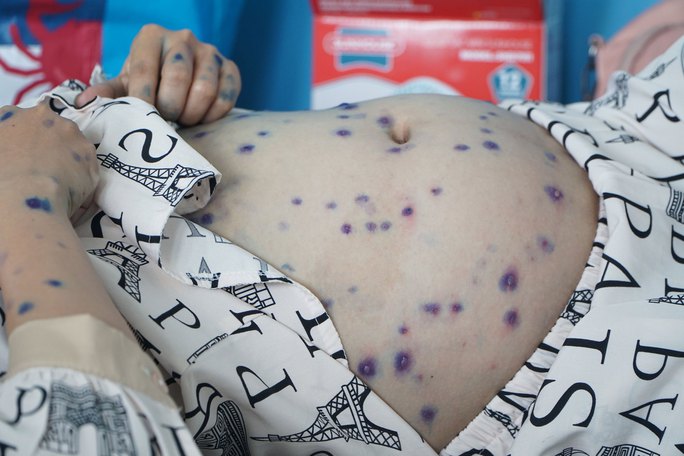In the first 3 months of 2023 alone, the Ho Chi Minh City Hospital for Tropical Diseases received more than 330 cases of chickenpox (commonly known as shingles). Of these, 15 cases were hospitalized, with 5 severe cases. In some northern provinces and cities, the number of chickenpox cases also showed signs of increasing. According to the Hanoi Center for Disease Control, from the beginning of 2023 to now, the city has had 548 cases of chickenpox.
Anyone can get infected
Doctor Vo Truong Quy, Deputy Head of Internal Medicine Department A - Ho Chi Minh City Hospital for Tropical Diseases, said that not only is the number of chickenpox cases increasing, but this year, the number of severe cases is also higher.
A typical case is a male patient in his late 30s, with no underlying medical conditions, who suddenly had body aches and blisters all over his body. Thinking it was a common illness, he bought medicine to take himself, but his condition worsened before he went to the hospital for examination.
When transferred to the Ho Chi Minh City Hospital for Tropical Diseases, this patient had acute respiratory failure, pneumonia, had to be intubated, put on a ventilator and used strong antibiotics. After a period of intensive treatment, the patient was out of danger.
"Due to the prolonged COVID-19 pandemic, people have not had the opportunity to get vaccinated, causing the number of chickenpox cases to increase. Ho Chi Minh City Hospital for Tropical Diseases still has 8 inpatients, 3 of whom need oxygen therapy," Dr. Quy informed.
Unpredictable complications
The National Children's Hospital said it had just treated a newborn baby with chickenpox with typical complications. That baby is D.H (27 days old, in Bac Giang ). The baby got the disease from his mother and 7-year-old sister. The baby had blisters, high fever, coughed a lot, had difficulty breathing, was diagnosed with pneumonia, and was treated at the provincial hospital for 4 days but did not improve, so he was transferred to a higher level.
According to Dr. Nguyen Phuong Thao, Center for Tropical Diseases - National Children's Hospital, from February to June every year, chickenpox often appears in children. Dr. Thao warned that children with chickenpox, especially newborns, have a high risk of death, up to 30% due to multi-organ damage. Children with chickenpox who are not treated promptly and properly can experience dangerous complications such as respiratory failure, septic shock, bacterial superinfection; at the same time, it can leave neurological complications and some other complications such as adrenal insufficiency, glomerulonephritis, eye damage, and even death.
"Children, especially infants, are susceptible to unpredictable complications when they get chickenpox. Therefore, it is extremely important for parents to recognize early symptoms of the disease and monitor for signs of worsening to take their children to a medical facility for timely treatment," Dr. Thao advised.

A 24-week pregnant woman with chickenpox is being treated at the Hospital for Tropical Diseases in Ho Chi Minh City. Photo: NGUYEN THUAN
In addition, Dr. Vo Truong Quy also noted that pregnant women with chickenpox are more dangerous than normal patients because their resistance is weak, the disease can easily progress, and there are many blisters. In particular, blisters appearing in the perineum can easily cause urinary tract infections leading to blood infections, affecting the fetus.
Pregnant women in the last 3 months of pregnancy, if they get chickenpox, will be dangerous for the fetus - it can cause birth defects such as skin scars, muscle atrophy, mental retardation. The most dangerous stage is when the mother gets chickenpox from 5 days before giving birth to 2 days after giving birth, the possibility of the baby being born with the disease is very high, easily getting worse and dying.
Treatment as soon as possible
According to Dr. Vo Truong Quy, chickenpox can appear at any age, but mainly between 15-40 years old. The initial signs are that the patient feels chills, fever, muscle aches, and within 12-24 hours, small round spots will appear. These spots will progress to blisters, the blisters will grow larger every day, if not broken, after 7 days the blisters will dry up and heal on their own.
People with underlying diseases, special constitutions, or infants and the elderly with chickenpox are likely to have severe progression. After the onset of fever, the patient will cough, have chest tightness, have difficulty breathing, the virus attacks the lungs causing pneumonia. If not treated promptly, chickenpox can later cause shingles, skin infections, sepsis, pneumonia, encephalitis, cerebellitis...
"When you have chickenpox, you need to get treatment as soon as possible within 72 hours of the onset of the disease. After this period of time, the effectiveness of the medicine in killing the virus will slow down," Dr. Quy emphasized.
According to Dr. Quy, chickenpox is easily spread in small communities, especially within families or neighborhoods. People who have not been vaccinated against chickenpox are susceptible to the disease through casual contact with sick people.
Chickenpox is completely preventable if the vaccine is given correctly. Children are usually vaccinated against chickenpox at 12-15 months of age, followed by a second dose at 4-6 years of age for lifelong protection. If the second dose is not given, the child is still susceptible to chickenpox.
People 12 years of age and older who have never been vaccinated against chickenpox should get 2 doses, 1-3 months after the first dose.
Misconceptions about chickenpox
According to Dr. Nguyen Phuong Thao, many people still believe that children with chickenpox must avoid water and wind, so they do not bathe their children. This is an incorrect concept. When children have chickenpox, parents should clean their bodies and take care of their skin properly to avoid infection, which can make the condition worse.
Although chickenpox can heal on its own within 1-2 weeks, doctors advise parents not to treat their children at home but to see a medical professional for examination and diagnosis to avoid the disease progressing.
Source
























![[Photo] National Assembly Chairman Tran Thanh Man visits Vietnamese Heroic Mother Ta Thi Tran](https://vphoto.vietnam.vn/thumb/1200x675/vietnam/resource/IMAGE/2025/7/20/765c0bd057dd44ad83ab89fe0255b783)












































































Comment (0)